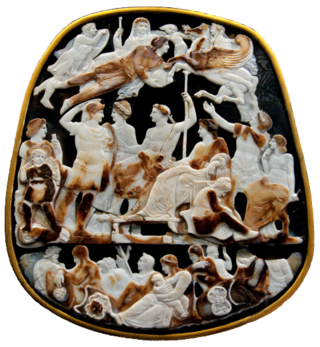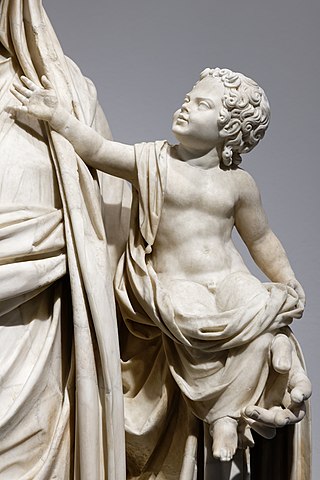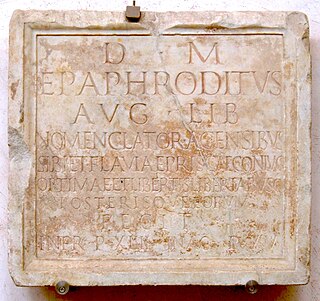
Julia Agrippina, also referred to as Agrippina the Younger, was Roman empress from 49 to 54 AD, the fourth wife and niece of Emperor Claudius, and the mother of Nero.

Tiberius Claudius Caesar Augustus Germanicus was the fourth Roman emperor, ruling from AD 41 to 54. A member of the Julio-Claudian dynasty, Claudius was born to Drusus and Antonia Minor at Lugdunum in Roman Gaul, where his father was stationed as a military legate. He was the first Roman emperor to be born outside Italy. Nonetheless, Claudius was an Italian of Sabine origins.

Gaius Caesar Augustus Germanicus, better known by his nickname Caligula, was the third Roman emperor, ruling from AD 37 until his assassination in AD 41. He was the son of the Roman general Germanicus and Agrippina the Elder, Augustus' granddaughter. Caligula was born into the first ruling family of the Roman Empire, conventionally known as the Julio-Claudian dynasty.

Galba was the sixth Roman emperor, ruling from AD 68 to 69. After his adoption by his stepmother, and before becoming emperor, he was known as Livius Ocella Sulpicius Galba. He was the first emperor in the Year of the Four Emperors and assumed the throne following Emperor Nero's suicide.

The Julio-Claudian dynasty comprised the first five Roman emperors: Augustus, Tiberius, Caligula, Claudius, and Nero.

Herod Agrippa, also known as Herod II or Agrippa I, was the last Jewish king of Judea. He was a grandson of Herod the Great and the father of Herod Agrippa II, the last known king from the Herodian dynasty. He was acquaintance or friend of Roman emperors and even played crucial roles in internal Roman politics.

Antonia Minor was the younger of two surviving daughters of Mark Antony and Octavia Minor. She was a niece of the Emperor Augustus, sister-in-law of the Emperor Tiberius, paternal grandmother of the Emperor Caligula and Empress Agrippina the Younger, mother of the Emperor Claudius, and maternal great-grandmother of the Emperor Nero. She outlived her husband Drusus, her oldest son, her daughter, and several of her grandchildren.

Tiberius Claudius Caesar Britannicus, usually called Britannicus, was the son of Roman Emperor Claudius and his third wife, Valeria Messalina. For a time, he was considered his father's heir, but that changed after his mother's downfall in 48, when it was revealed she had engaged in a bigamous marriage without Claudius' knowledge. The next year, his father married Agrippina the Younger, Claudius' fourth and final marriage. Their marriage was followed by the adoption of Agrippina's son, Lucius Domitius, whose name became Nero as a result. His stepbrother would later be married to Britannicus' sister Octavia and soon eclipsed him as Claudius' heir. After his father's death in October 54, Nero became emperor. The sudden death of Britannicus shortly before his fourteenth birthday is reported by all extant sources as being the result of poisoning on Nero's orders; as Claudius' biological son, he represented a threat to Nero's claim to the throne.
Gaius Calpurnius Piso was a Roman senator in the first century. He was the focal figure in the Pisonian conspiracy of AD 65, the most famous and wide-ranging plot against the throne of Emperor Nero.

I, Claudius is a historical novel by English writer Robert Graves, published in 1934. Written in the form of an autobiography of the Roman Emperor Claudius, it tells the history of the Julio-Claudian dynasty and the early years of the Roman Empire, from Julius Caesar's assassination in 44 BC to Caligula's assassination in AD 41. Though the narrative is largely fictionalized, most of the events depicted are drawn from historical accounts of the same time period by the Roman historians Suetonius and Tacitus.

The gens Julia was one of the most prominent patrician families in ancient Rome. Members of the gens attained the highest dignities of the state in the earliest times of the Republic. The first of the family to obtain the consulship was Gaius Julius Iulus in 489 BC. The gens is perhaps best known, however, for Gaius Julius Caesar, the dictator and grand uncle of the emperor Augustus, through whom the name was passed to the so-called Julio-Claudian dynasty of the first century AD. The nomen Julius became very common in imperial times, as the descendants of persons enrolled as citizens under the early emperors began to make their mark in history.

Aelia Paetina or Paetina was the second wife of the Roman Emperor Claudius. Her biological father was a consul of 4 AD, Sextus Aelius Catus, while her mother is unknown.

Tiberius Claudius Epaphroditus or Epaphroditos, was a freedman and secretary of the Roman Emperor Nero. He was later executed by Domitian for failing to prevent Nero's suicide.

Tiberius Claudius Narcissus was one of the freedmen who formed the core of the imperial court under the Roman emperor Claudius. He is described as praepositus ab epistulis.
Marcus Antonius Pallas was a prominent Greek freedman and secretary during the reigns of the Roman Emperors Claudius and Nero. His younger brother was Marcus Antonius Felix, a procurator of Iudaea Province. According to Tacitus, Pallas and Felix descended from the Greek Kings of Arcadia. He is described as praepositus a rationibus.

The Roman imperial cult identified emperors and some members of their families with the divinely sanctioned authority (auctoritas) of the Roman State. Its framework was based on Roman and Greek precedents, and was formulated during the early Principate of Augustus. It was rapidly established throughout the Empire and its provinces, with marked local variations in its reception and expression.
Decimus Valerius Asiaticus was a prominent Roman Senator of provincial origin. Asiaticus was twice consul: first in 35 as suffect consul with Aulus Gabinius Secundus as his colleague; second in 46 as ordinary consul with Marcus Junius Silanus as his colleague. He was the first man from Gaul to be admitted into the Roman Senate, as well as the first man from Gaul to attain the consulship.

De vita Caesarum, commonly known as The Twelve Caesars, is a set of twelve biographies of Julius Caesar and the first 11 emperors of the Roman Empire written by Gaius Suetonius Tranquillus. The group are: Julius Caesar, Augustus, Tiberius, Caligula, Claudius, Nero, Galba, Otho, Vitellius, Vespasian, Titus, Domitian.
Gaius Nymphidius Sabinus was a Prefect of the Praetorian Guard during the rule of Emperor Nero from AD 65 until his death in 68. He shared this office together with Ofonius Tigellinus, replacing his previous colleague Faenius Rufus. During the second half of the 60s, Nero grew increasingly unpopular with the people and the army, leading to a number of rebellions which ultimately caused his downfall and suicide in 68. Nymphidius took part in the final conspiracy against Nero and persuaded the Praetorian Guard to desert him, but when he attempted to have himself declared emperor, he was killed by his own soldiers.
Mnester was a renowned pantomime actor who flourished during the reigns of Roman Emperors Caligula and Claudius. Caligula admired Mnester greatly. Suetonius writes that “in relation to all those who were [Caligula’s] favourites, his behavior constituted madness. He used to kiss the pantomime actor Mnester even in the middle of the games. And if, when Mnester was performing, anyone made the slightest noise, he had him dragged from his seat and flogged him himself.”














